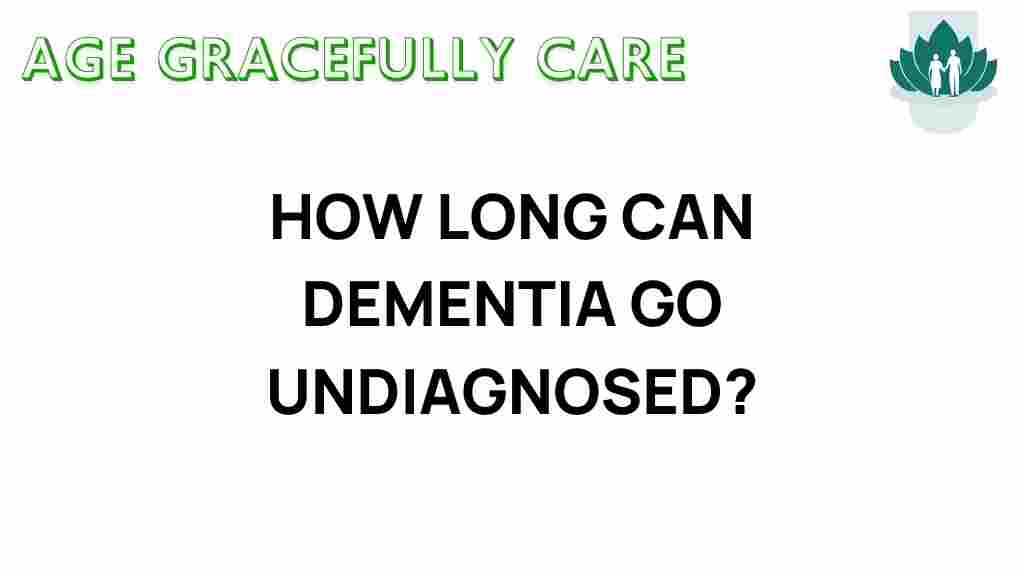The Silent Struggle: How Long Can Dementia Remain Undiagnosed?
Dementia is a complex and often misunderstood condition that affects millions of people worldwide. As the population ages, the prevalence of dementia is on the rise, making it more crucial than ever to raise awareness about its symptoms and the importance of early diagnosis. Unfortunately, dementia can remain undiagnosed for years, leading to a silent struggle for both patients and their families. In this article, we will explore the reasons why dementia can go undiagnosed, the symptoms to watch for, and the importance of increasing awareness in healthcare settings.
Understanding Dementia and Its Symptoms
Dementia is an umbrella term for a range of cognitive impairments that interfere with daily life and activities. It is not a specific disease but rather a collection of symptoms that can result from various underlying issues, including Alzheimer’s disease, vascular dementia, and Lewy body dementia. Common symptoms include:
- Memory loss
- Difficulty communicating
- Challenges with reasoning and problem-solving
- Changes in mood and behavior
- Disorientation to time and place
As these symptoms progress, they can significantly impact the mental health and quality of life of individuals affected. Recognizing these symptoms early is crucial for effective management and support.
Why Dementia Remains Undiagnosed
Despite the availability of diagnostic tools and resources, dementia often goes unrecognized for several reasons:
- Stigma and Misunderstanding: Many people see cognitive decline as a normal part of aging, leading to misconceptions that prevent seeking help.
- Lack of Awareness: Both patients and caregivers may not recognize early symptoms or may attribute them to stress or fatigue.
- Healthcare System Challenges: Primary care providers may not have sufficient training in recognizing dementia symptoms or may overlook them during routine check-ups.
- Variability of Symptoms: Symptoms can vary widely among individuals, making diagnosis more complicated.
These factors contribute to a significant number of people living with undiagnosed dementia, which can delay access to necessary treatment and support.
The Importance of Early Detection in Dementia
Early detection of dementia is paramount for several reasons:
- Improved Quality of Life: Early diagnosis allows for timely interventions that can enhance the quality of life and preserve independence.
- Access to Resources: Patients and families can access healthcare resources and support networks sooner, improving overall care.
- Planning for the Future: With a diagnosis, individuals can make informed decisions about their care and future needs.
- Research Participation: Early detection allows individuals to participate in clinical trials and studies aimed at finding new treatments.
Recognizing the symptoms of cognitive decline and seeking a diagnosis can make a significant difference in the lives of those affected by dementia.
Steps to Take for Early Detection
If you or a loved one are experiencing potential symptoms of dementia, consider the following steps:
- Document Symptoms: Keep a detailed record of changes in memory, behavior, and daily functioning. This documentation can help healthcare providers make informed decisions.
- Schedule a Healthcare Appointment: Contact a primary care physician or specialist to discuss concerns. It is essential to communicate openly about symptoms and any changes observed.
- Undergo Diagnostic Tests: Healthcare providers may recommend cognitive assessments, blood tests, or imaging studies to rule out other conditions and confirm a diagnosis.
- Seek Support: Engage with support groups or mental health professionals to navigate the emotional aspects of diagnosis and caregiving.
Taking these steps can facilitate early diagnosis and better management of dementia.
Raising Awareness About Dementia
Increasing awareness about dementia is crucial for improving diagnosis rates and providing better support for individuals and families. Here are some ways to raise awareness:
- Education: Participate in workshops, webinars, and community events to learn more about dementia and its symptoms.
- Advocacy: Support local and national organizations that promote dementia awareness and research.
- Share Knowledge: Discuss information about dementia with family, friends, and colleagues to reduce stigma and encourage open conversations.
For more information on dementia awareness campaigns, you can visit the Alzheimer’s Association.
Challenges in the Healthcare System
The healthcare system plays a critical role in the timely diagnosis of dementia. However, several challenges exist:
- Lack of Training: Many healthcare professionals receive limited training on cognitive decline and dementia, which can lead to misdiagnosis or missed diagnoses.
- Time Constraints: Primary care visits are often short, making it challenging to address complex cognitive assessments during routine check-ups.
- Fragmentation of Care: Patients may see multiple specialists, leading to communication gaps and delays in diagnosis.
Addressing these challenges is essential for improving the early detection of dementia in healthcare settings.
Troubleshooting Tips for Families and Caregivers
For families and caregivers who suspect that a loved one may be experiencing symptoms of dementia, here are some troubleshooting tips:
- Be Patient: Understand that cognitive decline can be frustrating for both the individual and their loved ones. Approach conversations with empathy.
- Encourage Routine Check-ups: Regular medical appointments can help monitor cognitive changes and ensure that any emerging symptoms are addressed.
- Utilize Memory Aids: Encourage the use of calendars, reminders, and note-taking to help individuals stay organized and reduce anxiety.
- Stay Engaged: Encourage social interactions and cognitive activities like puzzles or games to help maintain cognitive function.
These strategies can provide support for both individuals and their caregivers during challenging times.
Conclusion
The silent struggle with dementia is a pressing issue that affects many individuals and families. Understanding the symptoms, recognizing the importance of early diagnosis, and raising awareness are essential steps in combating this prevalent condition. By fostering open communication and increasing education around dementia, we can help ensure that fewer people go undiagnosed and receive the support they need.
As we navigate the complexities of aging and mental health, let us strive to create an environment where dementia is recognized early, allowing those affected to lead fulfilling lives. For more resources and information, consider visiting Dementia Support Network to explore support options and educational materials.
This article is in the category Health and created by AgeGracefullyCare Team
